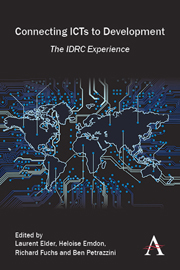Book contents
- Frontmatter
- Contents
- Acknowledgments
- Introduction Part I From Heresy to Orthodoxy: ICT4D at IDRC
- Introduction Part II From Beginning to End to Beginning Again
- Chapter 1 Catalyzing Access through Social and Technical Innovation
- Chapter 2 Catalyzing Access via Telecommunications Policy and Regulatory Research
- Chapter 3 Access to Knowledge as a New Paradigm for Research on ICTs and Intellectual Property
- Chapter 4 ICTs and Social Inclusion
- 5 Access and Usage of ICTs by the Poor (Part I)
- Chapter 6 Local Economic Opportunities and ICTs: How ICTs Affect Livelihoods (Part II)
- Chapter 7 Research on eHealth across Health Systems: Contributions to Strengthen a Field
- Chapter 8 Making the Grade: The Role of ICTs in Providing Access to Knowledge
- Chapter 9 E-Government for Development: ICTs in the Public Sector and the Evolving Citizen–Government Relationship
- Chapter 10 Innovations in Evaluating ICT4D Research
- Chapter 11 Conclusions: A Decade of Innovation that Matters
- Epilogue Into the Future: New Opportunities and Threats in a Global Networked Society
- Author Biographies
Chapter 9 - E-Government for Development: ICTs in the Public Sector and the Evolving Citizen–Government Relationship
from Introduction Part II - From Beginning to End to Beginning Again
Published online by Cambridge University Press: 05 March 2014
- Frontmatter
- Contents
- Acknowledgments
- Introduction Part I From Heresy to Orthodoxy: ICT4D at IDRC
- Introduction Part II From Beginning to End to Beginning Again
- Chapter 1 Catalyzing Access through Social and Technical Innovation
- Chapter 2 Catalyzing Access via Telecommunications Policy and Regulatory Research
- Chapter 3 Access to Knowledge as a New Paradigm for Research on ICTs and Intellectual Property
- Chapter 4 ICTs and Social Inclusion
- 5 Access and Usage of ICTs by the Poor (Part I)
- Chapter 6 Local Economic Opportunities and ICTs: How ICTs Affect Livelihoods (Part II)
- Chapter 7 Research on eHealth across Health Systems: Contributions to Strengthen a Field
- Chapter 8 Making the Grade: The Role of ICTs in Providing Access to Knowledge
- Chapter 9 E-Government for Development: ICTs in the Public Sector and the Evolving Citizen–Government Relationship
- Chapter 10 Innovations in Evaluating ICT4D Research
- Chapter 11 Conclusions: A Decade of Innovation that Matters
- Epilogue Into the Future: New Opportunities and Threats in a Global Networked Society
- Author Biographies
Summary
Since the 1990s, much attention and many resources have been spent on the application of information and communications technologies (ICTs) in the public sector – traditionally known as e-government – to improve the administration and services of government (Fountain 2001; Bhatnagar 2004). ICTs were seen as having the potential to achieve two benefits: the bureaucratic outcome of increased efficiency through digitizing administration processes and services; and the political outcomes of reduced corruption, enhanced transparency and greater civic engagement (Madon 2009). Furthermore, these benefits were regarded as key ingredients in helping to renew the public's waning trust in governments around the world (Bellamy and Taylor 1998, 63).
Canada's International Development Research Centre's (IDRC's) “Information and Communications Technologies for Development” (ICT4D) program began supporting research on e-government in the early 2000s within a global context of Western countries consolidating e-government applications – with particular progress made in digitizing government administration and the electronic provision of services. The international community was greatly interested in bringing the benefits of e-government to developing countries. This transfer of technology was a means to promote “good governance” (Ciborra and Navarra 2005; Misuraca 2007; Madon 2009), which was seen as a key ingredient in socioeconomic development (United Nations Development Programme 2002). Early optimism, however, gave way to the emerging reality that only a small portion of e-government implementations could be deemed a success (Heeks 2003). Research and capacity building activities were viewed as critical inputs to help enable e-government implementations in developing countries that would both be successful and ensure the benefits flowed to marginalized populations.
- Type
- Chapter
- Information
- Connecting ICTs to DevelopmentThe IDRC Experience, pp. 215 - 240Publisher: Anthem PressPrint publication year: 2013



